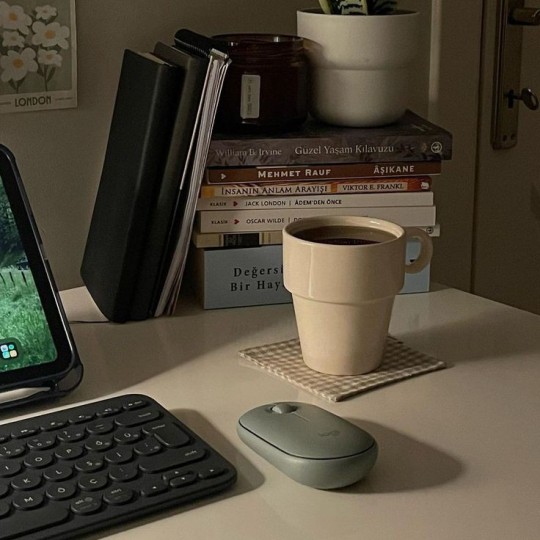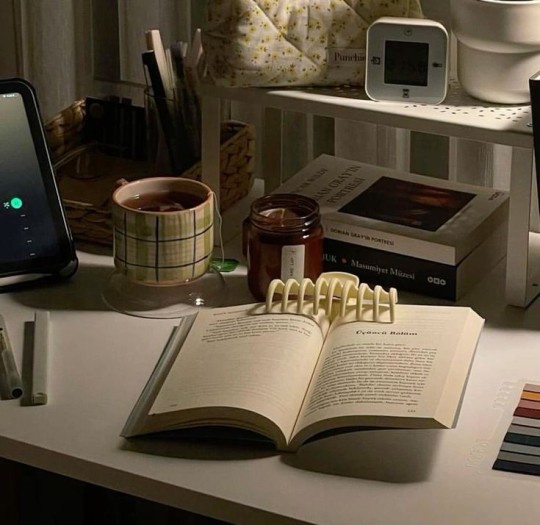[He/They] Just an autistic 31 year old British trans guy who wants to learn British Sign Language, Japanese and French, my lifelong goal is to publish a book. I am entirely self taught and do not go to school.
Don't wanna be here? Send us removal request.
Text




Even when you're tired, remember why you started.
8K notes
·
View notes
Text




[research life]
Some spring greenery among my study environments🌿🌷🤩🤍📝
1K notes
·
View notes
Text
May 14th, 2025:
One of my 30/10 Pomodoro sessions from today. I’m not done yet, but since I’m taking a break, I thought I’d share an update. Right now, I’m practicing by solving questions and creating flashcards for new topics. I'm studying logical expressions—it's tougher than it looks. I thought I had studied this before, but if I did, I don’t remember much. At least I have a beautiful day outside, it's giving me more energy. I still have three more sessions to go, so I’ll keep at it. Hope you’re all having a great day!
289 notes
·
View notes
Text






dear @judysdiary asked me about my desk setup a while ago. even though i’m late, i thought i’d share it like this :] once again sorry for replying this late and thank you lots for such an interesting question!<33 if you’re curious about something, you can ask me anytime!!
478 notes
·
View notes
Text
my best tip for anyone trying to get back into reading is to remember that you can read books to avoid other responsibilities in ur life and it can become a vice if you play your cards right
90K notes
·
View notes
Text

27K notes
·
View notes
Text
Negations 101
I don’t like cheese - Je n’aime pas le fromage
I don’t like cheese anymore - Je n’aime plus le fromage
I’ve never liked cheese - Je n’ai jamais aimé le fromage
I don't like cheese yet - Je n'aime pas encore le fromage
I still don't like cheese - Je n'aime toujours pas le fromage
I don't always like cheese - Je n'aime pas toujours le fromage
I don't like cheese that much - Je n'aime pas tant que ça le fromage
I don't necessarily like cheese - Je n'aime pas forcément le fromage
(I only like cheese) - Je n’aime que le fromage
I will never like cheese again - Je n'aimerais plus jamais le fromage
I don’t like cheese nor bread - Je n’aime ni le fromage ni le pain
None of my friends like cheese - Aucun de mes amis n’aime le fromage
I like no one - Je n’aime personne
I like nothing - Je n’aime rien
I never like anything - Je n'aime jamais rien
I no longer like anything - Je n'aime plus rien
He is nowhere - Il n’est nulle part
There’s nothing to do - Il n’y a rien à faire
I don’t see anyone - Je ne vois personne
I can't see him - Je n'arrive pas à le voir**
I see no solution - Je ne vois aucune solution
I never do anything - Je ne fais jamais rien
Don’t go! - Ne pars* pas / Ne partez pas
Don’t go there! - N’y va pas
*We use Partir rather than Aller which is a transitive verb i.e. requires an object (I'm leaving is an acceptable sentence but I'm going is considered unfinished).
**We don't use Pouvoir (to be able to) as it would refer to one's physical ability to see. My eyes are functional, I just can't spot people.
Learn more about "Ne".

522 notes
·
View notes
Text
Sentiment-related expressions
Avoir le béguin pour quelqu’un - Having a crush on someone
Avoir le coeur gros/serré - Having a heavy heart
Avoir le sang qui bout - Being very angry
Avoir le sang qui ne fait qu’un tour - Feeling a strong, negative emotion
Avoir les boules - Being upset
Avoir mauvaise conscience - Feeling guilty
Avoir un coeur d’artichaut - To fall in love easily
Avoir un noeud dans la gorge - Choking up
Broyer du noir - Feeling down
Faire grise mine - Sulking
Faire la soupe à la grimace - Looking annoyed, upset
Faire une drôle de tête - Looking sad, upset
Fleur bleue - Romantic, a bit naive
Heureux comme un roi - Very happy
Joie de vivre - Happiness
Malheureux comme les pierres - Very sad
Méchant comme une teigne - Very mean
Mi-figue mi-raisin - Unsure about what to think
Péter un plomb - Going ballistic
Prendre aux tripes - Shaking up, moving, overwhelming
Rester de marbre - Remaining stoic
Sauter au plafond - Being very enthusiastic
Se mettre en boule - Getting angry
Se mordre les doigts - Regretting something
Se replier sur soi-même - Withdrawing into oneself
Tirer son chapeau à quelqu’un - To take one’s hat off to someone
Tourner autour de quelqu’un - Flirting with someone
Tourner comme un lion en cage - Being restless, frustrated
Vider son sac - Pouring out one’s heart

1K notes
·
View notes
Text
Best language learning tips & masterlists from other bloggers I’ve come across
(these posts are not my own!)
THE HOLY GRAIL of language learning (-> seriously tho, this is the BEST thing I’ve ever come across)
Tips:
Some language learning exercises and tips
20 Favorite Language Learning Tips
what should you be reading to maximize your language learning?
tips for learning a language (things i wish i knew before i started)
language learning and langblr tips
Tips on how to read in your target language for longer periods of time
Tips and inspiration from Fluent in 3 months by Benny Lewis
Tips for learning a sign language
Tips for relearning your second first language
How to:
how to self teach a new language
learning a language: how to
learning languages and how to make it fun
how to study languages
how to practice speaking in a foreign language
how to learn a language when you don’t know where to start
how to make a schedule for language learning
How to keep track of learning more than one language at the same time
Masterposts:
Language Study Master Post
Swedish Resources Masterpost
French Resouces Masterpost
Italian Resources Masterpost
Resource List for Learning German
Challenges:
Language-Sanctuary Langblr Challenge
language learning checkerboard challenge
Word lists:
2+ months of language learning prompts
list of words you need to know in your target language, in 3 levels
Other stuff:
bullet journal dedicated to language learning
over 400 language related youtube channels in 50+ languages
TED talks about language (learning)
Learning the Alien Languages of Star Trek
.
Feel free to reblog and add your own lists / masterlists!
17K notes
·
View notes
Text
📺 words & expressions i have learned from french shows, movies, & tiktoks

c’est pas grave - it’s okay / it’s no big deal
(ne) t’inquiète (pas) - don’t worry
qu’est-ce que tu fais là ? - what are you doing here?
tu me manques - i miss you
on y va - let’s go
bien sûr - of course
j’suis là - i’m here
je vous en prie - you’re welcome (formal)
mytho - liar
ouais - yeah
un truc - something
voilà - there it is, that’s right, exactly, there you go
oh là là - wow, oh my god
bof - so-so, whatever
hein - the french “huh” or “eh”
ben / bah - well… / uhh…
s’il te plaît ➭ s’te plaît - please
félicitations - congratulations
un mec - a guy (slang)
une meuf - a girl (slang)
2K notes
·
View notes
Text
Irregular past participles
Acquérir (to acquire) → acquis
Apprendre (to learn) → appris
Atteindre (to attain) → atteint
Asseoir (to sit) → assis
Avoir (to have) → eu
Boire (to drink) → bu
Comprendre (to understand) → compris
Conduire (to drive) → conduit
Connaitre (to know) → connu
Construire (to build) → construit
Courir (to run) → couru
Couvrir (to cover) → couvert
Craindre (to fear) → craint
Croire (to believe) → cru
Décevoir (to deceive; to disappoint) → déçu
Découvrir (to discover) → découvert
Devoir (to have to) → dû
Dire (to say) → dit
Écrire (to write) → écrit
Etre (to be) → été
Faire (to do; to make) → fait
Falloir (to have to) → fallu
Instruire (to instruct) → instruit
Joindre (to join; to affix) → joint
Lire (to read) → lu
Mettre (to put) → mis
Mourir (to die) → mort
Naître (to be born) → né
Obtenir (to obtain) → obtenu
Offrir (to offer) → offert
Ouvrir (to open) → ouvert
Peindre (to paint) → peint
Permettre (to allow; to permit) → permis
Plaire (to please) → plu
Pleuvoir (to rain) → plu
Prendre (to take) → pris
Produire (to produce) → produit
Pouvoir (to be able to) → pu
Recevoir (to receive) → reçu
Réduire (to reduce) → réduit
Rire (to laugh) → ri
Savoir (to know) → su
Souffrir (to suffer) → souffert
Suivre (to follow) → suivi
Tenir (to hold) → tenu
Vivre (to live) → vécu
Valoir (to be worth) → valu
Voir (to see) → vu
Vouloir (to want) → voulu

#french#french resource#french vocab#resource#recourses#language resources#i'm british i know how to queue
2K notes
·
View notes
Text
Les autres pronoms
Possessive pronouns (mine, ours)
Masc. sg.: le mien, le tien, le sien, le nôtre, le vôtre, le leur
Fem. sg.: la mienne, la tienne, la sienne, la nôtre, la vôtre, la leur
Masc. pl.: les miens, les tiens, les siens, les nôtres, les vôtres, les leurs
Fem. pl.: les miennes, les tiennes, les siennes, les nôtres, les vôtres, les leurs
Ex: tu pensais que tu avais pris tes lunettes mais c'étaient les miennes - you thought you had taken your glasses but they were mine
Demonstrative pronouns
They replace demonstrative determiners followed by a noun
They can be one of three types: prepositional (c'est celle de Laure - it's Laure's), relative (les robes en soie sont celles que je préfère - silk dresses are the ones I prefer), or nominal (j'ajoute à cette lettre celle de mon fils - I add to this letter the one of my son).
Singular - celui (m), celle (f): celle en bleu - the blue one
Plural - ceux (m), celles (f): ceux-là sont mieux - those are better
Neutral - ceci - this (rare), cela - that, ça - this (short for cela): ça ira - that will be fine, c’/ce*: c’est un chien - this is a dog, ce sont des chats - those are cats
N.B. Adverbial particles -ci (short for ici) and -là are added to indicate the distance. Celui-ci means this one (close), celles-là those ones (far away).
*Do not mix up the masculine singular demonstrative determiner ce that is followed by a singular masculine noun (ce chat est blanc - this cat is white) and the demonstrative pronoun ce that is followed by est/sont (is/are) or a relative pronoun (c'est ce qu'il m'a dit - that is what he told me; ce sont les chaussures qu'il a choisies - those are the shoes he chose)
N.B. C'est is used with a noun: c'est un gentil garçon - he's a nice boy, an adverb: c'est si joli - it's so pretty, or a masculine singular adjective when talking about a situation or activity: c'est facile - it's easy. Il/Elle est is used with adjectives when talking about living beings or things: elle est grande - she's tall, in expressions: il était une fois - there one was, before a past participle: elle est partie - she's gone.

Relative pronouns
Relative pronouns represent the nouns placed in front of them
Que/qui
subject (qui), when talking about living beings or things and describing them, placed before a verb: la fille qui porte un pull rouge aime la glace - the girl that is wearing a red jumper likes ice cream
indirect object (qui), when talking about people, after a preposition, placed before either a determiner and a noun or a pronoun (la fille à qui tu as parlé aime la glace - the girl you talked to likes ice cream)
direct object (que), when talking about living beings or things, placed before either a determiner and a noun or a pronoun (la fille que tu aimes aime la glace - the girl you love likes ice cream)
Quoi
object, when talking about things, often vague (something, nothing): c’est ce à quoi j’ai pensé toute la journée - that is what I thought about all day long
Dont
possessive phrase (complément de nom): je bois dans une tasse dont la anse est cassée - I’m drinking from a mug that has a broken handle
indirect object, equivalent of "of which": le livre dont je t’ai parlé est sorti - the book I told you about is out
adjective object: les filles sont allées à un concert de Rihanna, dont elles sont fan: the girls have gone to a Rihana’s concert, whom they are fans of
Où
adverbial phrase of place: la chambre où je dors est la plus grande de la maison - the room I sleep in is the biggest in the house
adverbial place of time: septembre est le mois où je suis née - September is the month in which I was born
Compound relative pronouns
Auquel, duquel, lequel (marriage of prepositions à, de, le and of simple relative pronouns)
subject - rare, literary: j’ai appelé ma mère, laquelle m’a informée de ton accident - I called my mum who told me about your accident)
object, about things or animals: les chaises sous lesquelles je suis cachée sont en bois - the chairs under which I am hidden are made of wood; c’est l’endroit duquel il est parti - this is the place from which he left; les hommes auxquels elle parle sont allemands - the men she is talking to are German
Neutral relative pronouns
They are built by adding ce, which can be roughly translated as "the thing", to dont, que, qui and used when the antecedent isn't mentioned or when it's a clause often after a comma.
Ce qui is the subject of the verb that follow: je ne sais pas ce qui est tombé - I don’t know what fell down (word by word I don't know the thing that has fallen), j’ai eu un accident, ce qui explique pourquoi je suis en retard - I got in an accident, which explains why I’m late
Ce que or ce qu' is used as a direct object and is generally followed by a subject and a verb: ce que je te demande, c’est d’être à l’heure - what I’m asking you is to be on time (word by word the thing that I ask of you it is to be on time), c’est ce que je voulais dire - that’s what I meant
Ce dont is used as the preposition de’s object: ce dont j’ai peur, c’est qu’il revienne - what I'm afraid of is that he will come back (word by word the thing of which I'm afraid, it is that he comes back), c’est précisément ce dont je veux te parler - that is precisely what I want to talk to you about
N.B. To stress a point, we can use ce qui/que/dont + c’est/ce sont: ce qui me plaît le plus, c’est ta robe - what I most like is your dress.

Movie: Pierrot le fou - Jean-Paul Godard, 1965
276 notes
·
View notes
Text
Decided to get back into learning coding after taking a long ass break. I've started fresh since my knowledge wasn't that great to begin with and am starting with some of the free courses on codecademy, so far it's going well and it makes more sense to me the second time around. I'm starting with HTML, then I'll move to CSS and so on.
#studyblr#codeblr#studyspo#learning html#adventures in learning code#learning code#codecademy#iwanttolearnallthethings#my post
3 notes
·
View notes
Text
Every time I try to practice pronouncing Spanish words my bird thinks I'm talking to him and he gets all excited XD
3 notes
·
View notes
Text
Help to learn Mexican Spanish!
Okay so, my girlfriend is Mexican and I want to surprise her by learning her native language, I've never studied Spanish before so I'm not sure where to start, and then on top of that how do I learn the Mexican dialect? Any help would be greatly appreciated.
#studyblr#langblr#spanish#mexican#mexican spanish#learning spanish#spanish studyblr#studying spanish
5 notes
·
View notes
Text
Can anyone reblog this with images and/or explanations for how you organise vocab in a notebook?
#my post#studyblr#langblr#frenchblr#language learning#japanese language#french language#study advice#study tips#study blog#notebook#vocab
3 notes
·
View notes
Text
I've basically hidden all the items on my throne wishlist and put in a disability aid that would hopefully vastly improve my quality of life and help reduce my pain and sublocations by holding my body in place, I've enabled crowdfunding and I know it's expensive so I don't expect it any time soon but it would be so helpful to be able to function anywhere near an able bodied person. Any donation towards it no matter how small would mean the world to me
#eds#good samaritan#donation#donations#disability#please help#crowdfunding#help a stranger#ehlers danlos syndrome#hypermobile ehlers danlos#wishlist
0 notes